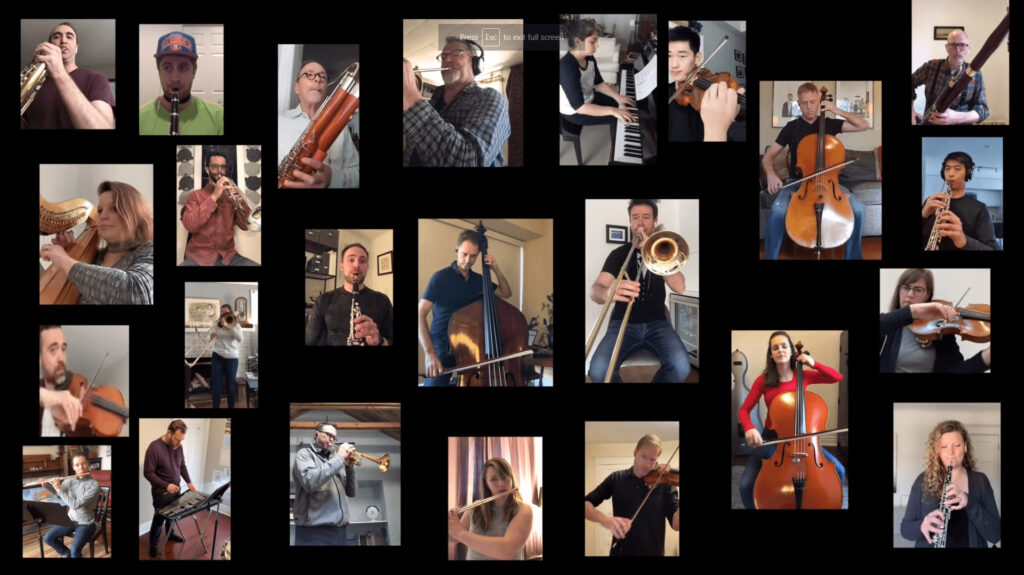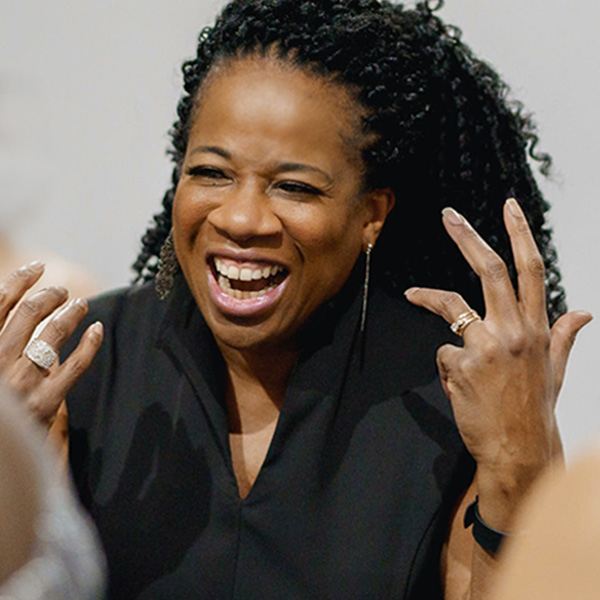Schulich School of Music community brings joy to the isolated by sharing art online
Concert halls around the globe have closed their doors and musicians everywhere are stranded at home – but this has not stopped McGillians from sharing their musical gifts. Using smartphones and various social media platforms, alumni, faculty and students from McGill’s Schulich School of Music are finding new ways to make music and bring people together in spirit.
An orchestra reunites virtually
One initiative that has been getting a lot of traction online is a physically distanced performance of Aaron Copland’s Appalachian Spring, put on by the Toronto Symphony Orchestra (TSO) on March 22.
Jeff Beecher, the TSO’s principal double bass player, recruited 29 musicians to participate, each recording their individual parts from home using smartphones and a “click track” to synchronize the tempo.
One of the musicians featured was Schulich School of Music alumnus Eric Abramovitz, BMus’16, who joined the TSO in 2018 as an associate principal clarinetist. Abramovitz, who can be spotted in the video wearing a Montreal Canadiens cap, says he immediately agreed to participate when Beecher reached out to him.
“As musicians, this is our livelihood and what we love to do. To not be able to do it is hard for all of us,” he says. “We’re all starving for something to feel like we’re collaborating with our colleagues.”
At first, Abramovitz was skeptical about the logistics of the performance and the sound quality from 29 phones. “I wasn’t sure how it would turn out, but it actually sounded quite good.”

“I think all of us, when we saw the video, the final product, it was really an emotional experience because we got to see ourselves playing with our colleagues, even if that wasn’t how it was when we were recording solo,” says Abramovitz. “For us, it was a great experience to be able to share our music again.”
So far, the video has received over 400,000 views on YouTube. The caption reads, “No matter what distance keeps us apart, we’ll still find ways to make music together and celebrate the gifts of spring.”
For Abramovitz, listening to and playing music has always been a way to get through hard times, so he was glad to be part of a project that has that effect on others. “The result is to bring a little positivity and light into their otherwise kind of grim days – it was very rewarding,” he says.
No better time to learn a new instrument
When soprano Suzie LeBlanc found herself stuck at home like so many others, she decided to tackle a project she’d been putting off since January. LeBlanc is a celebrated Acadian singer and early music vocal coach at the Schulich School of Music. She also directs Cappella Antica, the flagship vocal ensemble of McGill’s Early Music program.
“It’s a funny thing,” she says. “Suddenly, like very suddenly, you find yourself with free time. We’re not used to that. Also, of course, all my concerts for the next three months were cancelled. So I didn’t need to practice that music anymore.”
Instead, she set out to learn a book of songs from Shippagan, New Brunswick, that she’d found in her mother’s music collection and which were reminiscent of medieval and renaissance songs from France – music she specializes in.
In just a couple of days, she taught herself to play an Appalachian folk instrument called the dulcimer to accompany her vocal performance. “I wanted a different sound. Most singers can play guitar (except me!) and I just wanted something a little more unusual and easy to play.”
The dulcimer had been a decoration on her wall until now. “It’s been a dream of mine to accompany myself, but time was always lacking,” she says. So far, she’s recorded two songs on Facebook – Le Rossignol Sauvage and Le Berger – and is happy to see that others are doing the same.
“I think it’s beautiful that a lot people shared stuff without having technology, just recording it on their phones. There’s some really sleek ones out there but it’s also nice to see that people just need to share so badly that, like me, they just pushed the record button.”
The project was also a way for LeBlanc to deal with the pandemic. “I’m not a doctor or nurse, I can’t heal people that way. But I sing, so I guess I have to do that. It was a way of sharing, a way of beating the whole weirdness of the situation for myself, and getting a focus to my days,” she says.
Although LeBlanc is back to teaching courses remotely at McGill, as well as private students, she still plans to find time to learn more songs and, who knows, maybe another instrument. “I have many passions, so there’s never really time to feel at a loss for what to do.”
An outpouring of creativity
In March and April, many others in the McGill community have been busy posting videos for music lovers at home. Here are some examples of the projects Schulich faculty, students and alumni have been sharing on YouTube and Facebook:
Canadian opera star Julie Nesrallah, ArtDip’97, serenaded onlookers from her Toronto balcony with O Sole Mio.
From their homes in two different provinces, OSM concertmaster Andrew Wan (an assistant professor at McGill) and TSO concertmaster Jonathan Crow, BMus’98, performed Sonata in e minor, Op. 3, No. 5 by Jean-Marie Leclair. Wan also shared a video in which he plays Paganini’s Cantabile on the violin while accompanying himself on the piano.
Benjamin Deschamps, BMus’12, MMus’16, and the other members of the Ben Deschamps Big Band – many of which are Schulich alumni – put on a virtual performance of The Groove Merchant for jazz enthusiasts.
Performance jazz students Jeremy Alie Leon, Alex Muscalu, Cedric de Saint-Rome, Julien Lafreniere, and Paulo Max Riccardo continue to play together from across town, recently sharing a recording of David Binney’s Try.
Several alumni contributed to a video of Canadian singer-songwriter Pierre Lapointe performing the title song on his new album Pour déjouer l’ennui. Featured in the performance were percussionist Krystina Marcoux, MMus’13, and cellist Juan Sebastian Delgado, MMus’13, DMus’17. Sound recording doctoral student Jack Kelly did the audio, and Pascal Piché, BMus’15, prepared the video montage.
Prof. Jean-Sébastien Vallée led the Choir of St. Andrew & St. Paul in a rousing performance of Handel’s Hallelujah Chorus on Easter Sunday. Among the choir members were many Schulich alumni and students.
Musical couple Jean-François Normand and Éliane Charest-Beauchamp performed a duo for clarinet and violin in their living room. Normand teaches clarinet at the Schulich School of Music and Charest-Beauchamp is a former performance violin student.
Violinist Yolanda Bruno, BMus’11, shared a soothing rendition of Edelweiss and played alongside Eric Abramovitz in the TSO’s Appalachian Spring video.
While in self-isolation, trombonist Colin Lloyd, BMus’17, posted an arrangement of Ubi Caritas. He recorded different parts of the harmony separately and combined them in a video montage.
In a video dedicated to their Music Education students, assistant professor Lisa Lorenzino, MA’00, and course lecturer Steve Cowan, DMus’19, played one of Erik Satie’s Gymnopédies.
Prof. Richard Stoelzel was one of five trumpeters in a virtual performance of Within Sacred Walls by Erik Morales.
Sporting a Montreal Canadiens jersey, Bell Centre organist Diane Bibaud, BMus’78, played some hockey favourites from home.
After returning to her home country of New Zealand at the end of March, DMus student Hannah Darroch had to self-isolate in an Auckland hotel room for 14 days. The flutist recently shared one of her “quarantine hotel jams”.
Pianist and up-and-coming conductor Nicolas Ellis, MMus’15, put on a live Facebook concert in partnership with La Fabrique culturelle. In his very first “family concert”, Ellis was accompanied by his mother on the violin and his father on the cello.
For more content like this, head over to the Schulich School of Music’s Facebook page.


